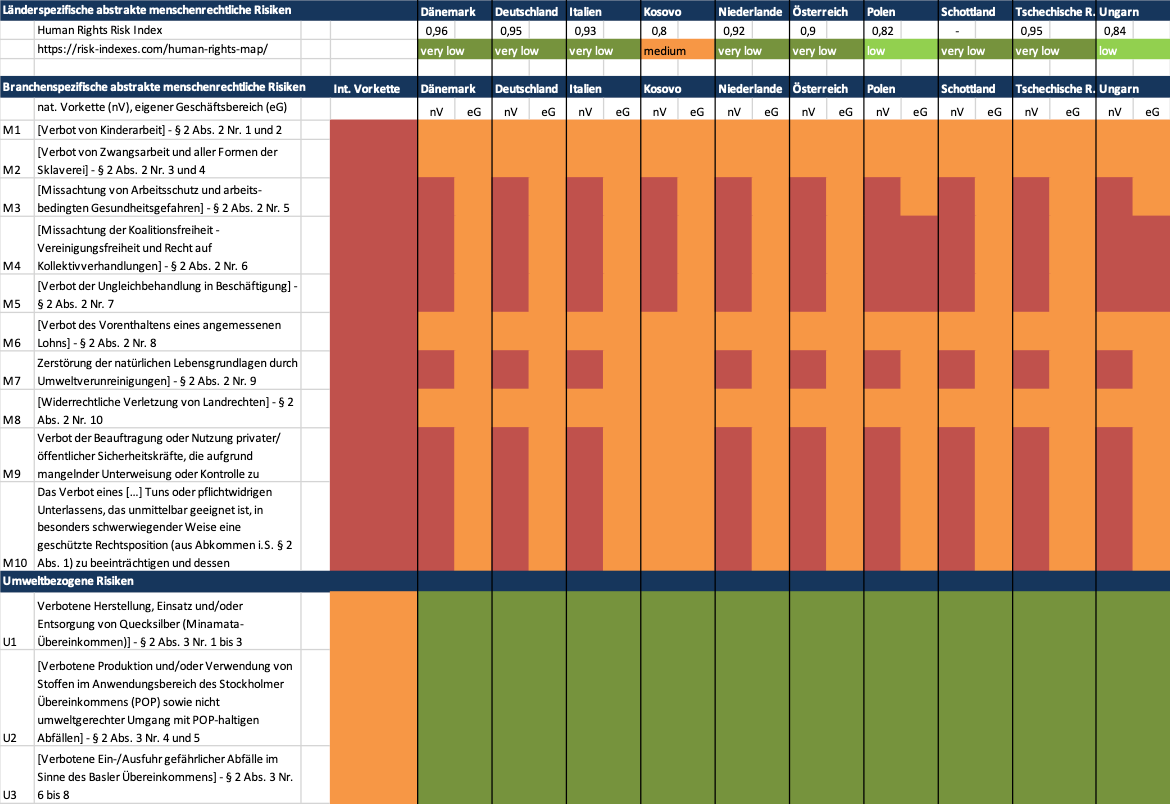a&o Declaration of Principles on Human Rights
With this declaration of principles, we as the a&o Group - today the largest private hostel chain in 9 European countries with 39 hostels in 25 cities - emphasize our commitment to respecting human rights.
This declaration of principles is issued in accordance with Section 6 (2) sentence 2 of the German Supply Chain Duty of Care Act (LkSG), even if we are not legally obliged to do so due to our number of employees. You may also recognize from this that we are very interested in this topic - because we believe it is „the right thing to do“.
In 2021, we defined human rights as one of our strategic sustainability areas as the result of a comprehensive materiality assessment. Accordingly, respect for them was firmly anchored in the „a&o Integrity Code“ and the „a&o Guideline for Responsible Purchasing“ and addressed on a risk-based basis.
As a company in the European tourism industry, whose specific potential risks also form the basis of this policy statement, we address two areas in particular. Firstly, respect for human rights in our own business operations, i.e. directly in our local hostels. And secondly, with regard to the services and goods we purchase (with national and international supply chains).
In our efforts to respect and uphold human rights, we know that only collective action will lead to success - from all our employees within the scope of our capabilities, our suppliers, government agencies, civil society actors, etc. With this in mind, let us work together to achieve this fundamentally important goal. We are ready to do our best to achieve it.
1. Human rights due diligence process at a&o
1.1 External reference systems
In shaping our human rights approach, we are guided by various external reference systems - in particular the International Bill of Human Rights, the Declaration on Fundamental Principles and Rights at Work of the International Labor Organization (ILO core labor standards), the UN Guiding Principles on Business and Human Rights, the OECD Guidelines for Multinational Enterprises and other laws and guidelines based on them, and the European Convention for the Protection of Human Rights and Fundamental Freedoms.
Where local law and international human rights conflict, we will comply with national law and seek ways to respect international human rights as far as possible.
1.2 Internal principles and guidelines
The requirement to uphold and respect human rights is already enshrined in several internal principles and guidelines. These include, in particular, the "a&o Code of Ethics"1, which is binding for all a&o employees, and the "a&o Responsible Sourcing Policy"2. The latter formulates our sustainability requirements and further expectations (on climate and environmental protection, human rights and responsible business conduct) for our suppliers and is brought to the attention of these suppliers as part of a&o's purchasing contracts.
1.3 Responsibilities
The a&o Chief Executive Officer/Managing Director is responsible for the implementation of this policy statement. He is supported in particular by a&o's internal legal department, which also includes the position of "a&o Human Rights Officer". The task of our Human Rights Officer is, on the one hand, to develop and implement the overarching a&o approach to human rights due diligence and, on the other hand, to support the house managers in the a&o hostels on site in its implementation. The hostel managers are also responsible for implementation at the respective a&o location and report to the legal department, which in turn regularly informs the a&o management.
1.4 Procedures for the fulfillment of human rights due diligence obligations
In order to comply with international human rights standards and continuously adapt our approach to developments in the human rights situation, we set up a risk management system in accordance with Section 4 (1) LkSG and carry out an annual human rights due diligence review and risk analysis in accordance with Section 5 (1) LkSG. This involves identifying, evaluating, weighting and prioritizing potential and actual negative impacts on human rights in our own business area and in the services and goods we purchase in order to address them in a targeted manner.
2. Communicating a&o's expectations to employees and suppliers
We have clear expectations of our employees, suppliers and partners to respect and uphold human rights in accordance with our own standards and in line with this declaration of principles. We have therefore communicated and will continue to communicate the content and requirements of this declaration of principles to employees and partners in a target group and task-oriented manner in order to raise their awareness and support them in implementing them in their respective areas of responsibility. Areas directly affected will receive specific training on this.
In addition to this declaration of principles, these expectations are also formulated for employees in the "a&o Code of Ethics", which is binding for all employees and thus communicated to them.
Suppliers and partners can also find detailed a&o requirements and expectations regarding human rights (as well as environmental protection and responsible business conduct) in the "a&o Responsible Sourcing Policy". This is also the assessment standard for the employees of our purchasing department in order to take compliance with human rights (and other sustainability aspects) into account in purchasing decisions.
In addition to direct communication to employees (via the a&o Code of Ethics) and partners (via the a&o Responsible Sourcing Policy), we also report publicly on our efforts to respect and uphold human rights3 on our company website in the regularly published sustainability report.
3. Abstract analysis of priority risks for a&o
In order to prioritize human rights and environmental risks in accordance with the requirements of Section 6 (2) sentence 3 no. 2 LkSG and to address them for the a&o Group, an abstract risk analysis described briefly below was carried out and used as the basis for this declaration of principles. This risk analysis takes particular account of:
- Industry-specific risks in tourism - based on an industry analysis by the Federal Ministry of Labor and Social Affairs4, among others, as well as
- country-specific risks for all a&o locations in Germany, Austria, the Czech Republic, Denmark, Hungary, Italy, the Netherlands, Poland, Scotland and Kosovo - for which independent, external sources were used (such as country indices for human rights or information from governments or civil society).
The risk assessment is carried out both for the a&o hostels' own local business area and for their national and international suppliers.
The following table shows the basic assessments of country and sector risks (M1-10 and U1-3) on which the risk analysis is based in the form of a heat map.

The heat map allows the following generic conclusion to be drawn regarding the abstract human rights risks for a&o, which are given priority in a&o's human rights work (the concrete risk analysis based on this):
- Purchased goods with international upstream chains (e.g. for furniture or individual food or beverages) pose a potentially high risk for all a&o locations, particularly with regard to health and safety hazards in the workplace.
- Although there is a "very low" or "low" country risk for all a&o locations, the sources considered recommend increased diligence due to a high/medium risk in the company's own business area for low-wage activities (e.g. cleaning staff, guards and security personnel). The same applies if these services are purchased nationally.
- Due to the business model of the tourism industry, human rights risks as a result of environmental violations (environmental risks U1-U3) can potentially be classified as rather low.
- Critical reports from civil society suggest that Poland and Hungary (unlike the other countries) should also pay particular attention to individual human and employee rights (e.g. equal treatment) in their own business areas.
4. Reporting concerns
We encourage our employees, suppliers or other stakeholders to notify us of any concerns regarding a possible violation of applicable law or other principles and guidelines, such as this "a&o Declaration of Principles on Human Rights". We will review the reports, confidentially if requested, and process them accordingly. Possible concerns can be reported or submitted at any time via one of the following channels.
Postal address:
a&o Hostels GmbH & Co. KG
Legal Department, FAO: Ms. Amina Okita
Adalbertstr. 50
10179 Berlin
Germany
By E-Mail:
[email protected]
Suppliers are also required to make their supply chains aware of the available channels for reporting complaints (see also the a&o Responsible Sourcing Policy). In addition, it must be ensured that this information is passed on to the lower levels of the supply chain and that suppliers have set up an equivalent complaints format for their own supply chain.
REFERENCES
1 Available at https://www.aohostels.com/en/code-of-ethics/
2 Available at https://www.aohostels.com/en/responsible-sourcing-policy/
3 Siehe „a&o Sustainability Report 2022“.
4 Cf. Federal Ministry of Labor and Social Affairs, BMAS (2020) - esp. p. 196 ff. „Tourism and leisure“)

























